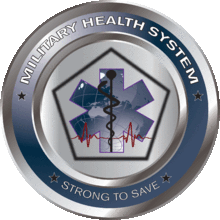Military Health System
 |
|
| Agency overview | |
|---|---|
| Headquarters | Washington, DC |
| Employees | 137,000 |
| Annual budget | $50 billion |
| Agency executive |
|
| Website | www.health.mil |
The Military Health System is the enterprise within the United States Department of Defense that provides health care to active duty and retired U.S. Military personnel and their dependents. Its mission is to provide health support for the full range of military operations and sustain the health of all who are entrusted to MHS care.
Its primary mission is to maintain the health of military personnel, so they can carry out their military missions; and to deliver health care during wartime. Often described as the medical readiness mission, this effort involves medical testing and screening of recruits, emergency medical treatment of troops involved in hostilities, and the maintenance of physical standards of those in the armed services.
The MHS also provides, where space is available, health care to dependents of active duty service members, to retirees and their dependents, and to some former spouses. Such care has been made available since 1966, (with certain limitations and co-payments), through the Civilian Health and Medical Program of the Uniformed Services (CHAMPUS) and its successor, TRICARE. In October 2001, TRICARE benefits were extended to retirees and their dependents aged 65 and over.
The MHS has a $50 billion budget and serves about 10 million beneficiaries, including active duty personnel and their families and retirees and their families. The actual cost of having a government-run health care system for the military is higher because the wages and benefits paid for military personnel who work for the MHS and the retirees who formerly worked for it, is not included in the budget. MHS employs more than 137,000 in 65 hospitals, 412 clinics, and 414 dental clinics at facilities across the nation and around the world, as well as in contingency and combat-theater operations worldwide.
Before the Civil War, medical care in the military was provided largely by the regimental surgeon and surgeons' mates. While attempts were made to establish a centralized medical system, care provision was largely local and limited. Treatment for disease and injury was, by modern standards, primitive.
The Civil War saw improvements in medical science, communications and transportation that made centralized casualty collection and treatment more practical.
...
Wikipedia
